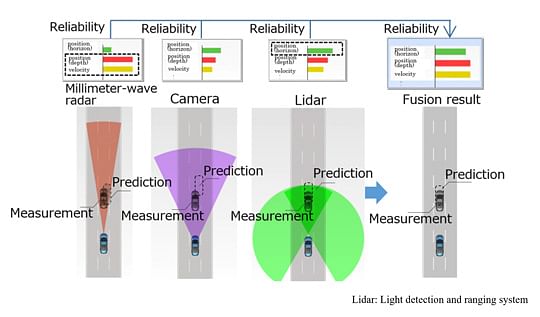Mitsubishi develops advanced sensing technology for Autonomous vehicles
Mitsubishi claims that their technology could deliver steady performance even in dense fog or heavy rain. It will be out in the market by 2023.
Mitsubishi Electric Corporation has developed a sensing technology for highly accurate detection of vehicle perimeters even in dense fog or heavy rain. The technology is expected to enable autonomous-driving and driving-assistant systems to work stably even in rough weather, where the detection accuracy of conventional sensors tends to deteriorate significantly.
According to Mitsubishi, research and development efforts continue to focus on raising the detection accuracy of sensors used in autonomous vehicles and its driving-assistant systems. These systems rely on various kinds of sensors to confirm the positions, velocities, sizes, and other data of obstacles in the paths of vehicles. It is to be noted that conventional systems using such sensors have not performed well in dense fog or heavy rain conditions that lower electrical and laser wave permeability and camera visibility.
Mitsubishi’s new technology is said to select and integrate information from multiple sensors based on the reliability of the information. Time series data (velocity, width, orientation, distance and others) obtained from various sensors are analysed in real-time to predict the reliability of each sensor's information affected by weather, based on its respective features. By selecting and integrating information determined to be highly reliable, high-accuracy detection is said to be possible even in rough weather.

The technology was deployed with an autonomous emergency braking (AEB) system in tests to verify the performance of real vehicles in rough weather and the AEB system was confirmed to achieve safe emergency braking even in conditions where sensors normally do not perform well. Going forward, the company will perform evaluation testing in actual environments and continue development of the technology with the aim of commercialisation from the year 2023 onwards. The company expects future application of this technology in autonomous vehicles for safe and accurate lane changes even in rough weather.
RELATED ARTICLES
Autoliv Plans JV for Advanced Safety Electronics With China’s HSAE
The new joint venture, which is to be located strategically near Shanghai and close to several existing Autoliv sites in...
JLR to Restart Production Over a Month After September Hacking
Manufacturing operations at the Tata Group-owned British luxury car and SUV manufacturer were shut down following a cybe...
BYD UK Sales Jump 880% in September to 11,271 units
Sales record sets the UK apart as the largest international market for BYD outside of China for the first time. The Seal...






 By Autocar Professional Bureau
By Autocar Professional Bureau
 13 Feb 2019
13 Feb 2019
 6783 Views
6783 Views





 Ajit Dalvi
Ajit Dalvi




